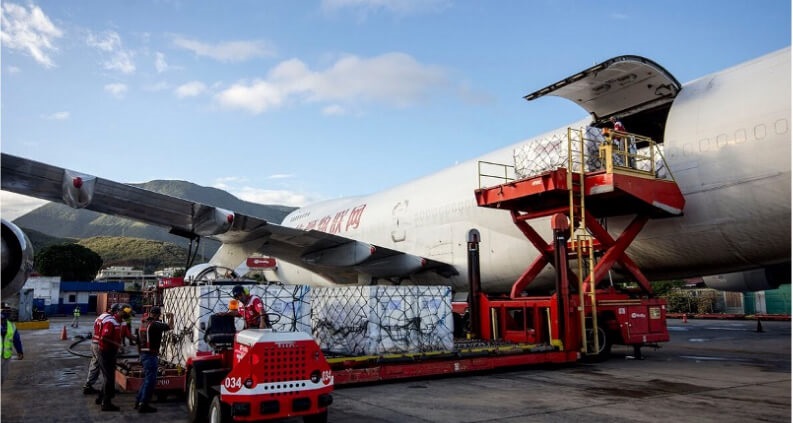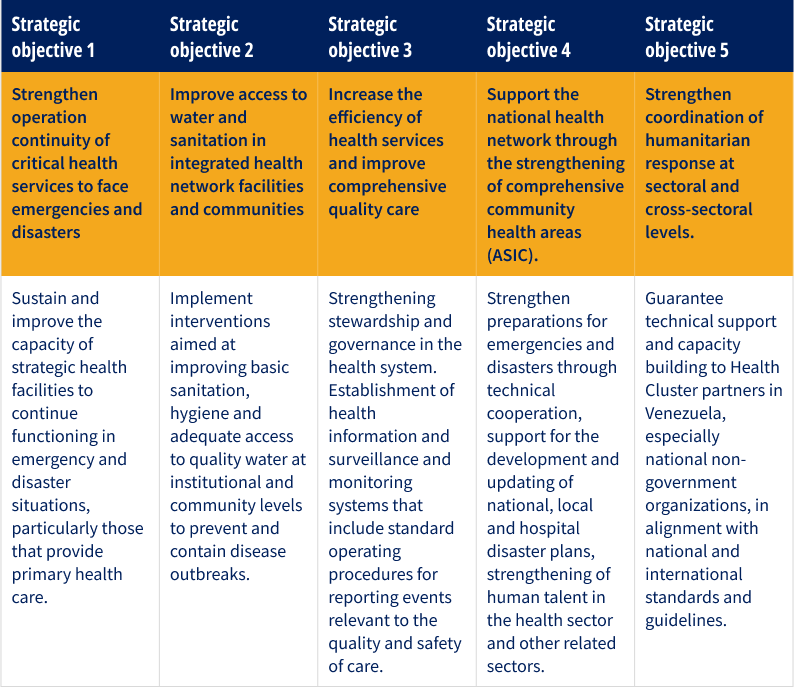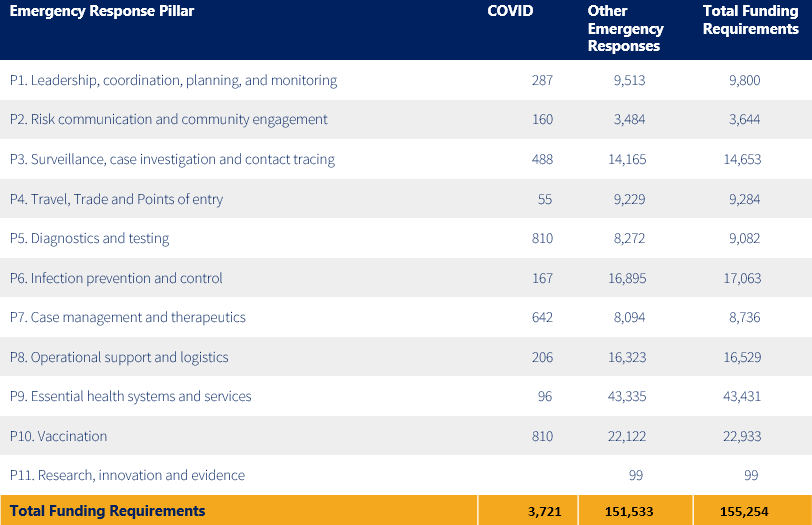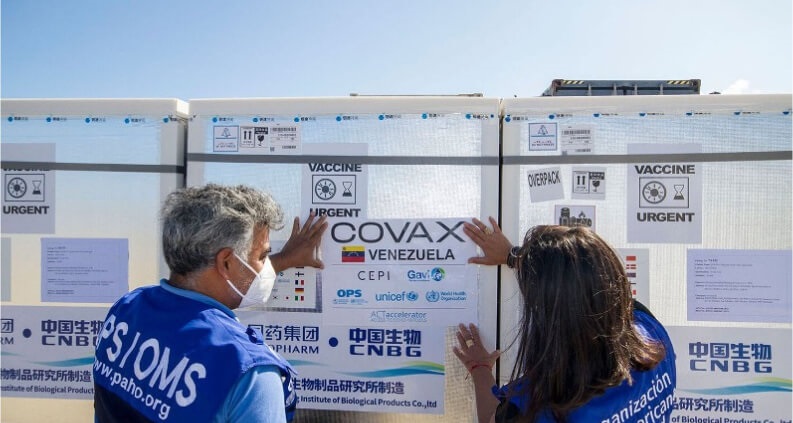
Bolivarian Republic of Venezuela
Bolivarian Republic of Venezuela
- People in need: 7 million1
- People targeted: 5.2 million
- Requirements (US$): 155.3 million
The Bolivarian Republic of Venezuela has been facing a prolonged socio-political and economic situation that has profoundly and negatively impacted social and health indicators. The humanitarian context in the country was further aggravated by the COVID-19 pandemic, which stretched the limits of an already weakened national health system. Violence and social conflicts, hyperinflation, constant political tensions, the persistence of migratory movements and intensification of climate threats and natural hazards have worsened the living conditions and health status of populations in situations of vulnerability including women, children and indigenous populations.
While the first two years of the pandemic were marked by the large influx of returnees back to Venezuela, the continued deteriorating political, socio-economic and human rights situation in the country resulted in renewed increased migration of Venezuelans in 2022. The profile of Venezuelan migrants has progressively changed over the years, from single men in search of better economic opportunities to families with women and children in situations of extreme vulnerability. The increasingly irregular and unsafe journeys of those migrants are constantly putting their lives at high risk.
Besides its socio-economic impacts, the COVID-19 health emergency itself remains a health threat to Venezuelans, with less than 50% of the population being vaccinated with two doses. Indirectly, the COVID-19 pandemic has caused major disruptions in the provision of health services and treatment of medical conditions resulting in the worsening of pre-existing conditions and increases in preventable morbidity and mortality. The lack of appropriate infrastructure, as well as adequate water, sanitation and hygiene in many health institutions and households additionally hinders the provision of timely and quality health care services. The fragility of the health system deepens the vulnerability of at-risk populations, especially in the event of potential natural disasters.
Recurrent floods and landslides caused by intense rainfalls in 2022 have also resulted in deaths, destruction of homes and health facilities, human displacement and increases in health issues that often follow such disasters, such as respiratory infections, dehydration, water-borne diseases, skin and eye infections and mental health disorders.

Arrival of COVID-19 vaccine doses in Venezuela. January 2022.
Emergency response
In this complex humanitarian environment, WHO’s priorities for 2023 in Venezuela will focus on sustaining – and where possible strengthening – operational and functional capacities of critical and essential health services, through a primary health care approach, so as to ensure the operationality, safety and resilience of local health systems.
Humanitarian assistance in health will target improving access to health services, especially to the most vulnerable populations and those living in hard-to-reach areas, by supporting the continued availability of essential medicines, medical equipment and supplies through direct procurement and strategic partnerships with other humanitarian actors; carrying targeted improvement works and rehabilitation of priority health facilities to support the provision of comprehensive, timely and quality services, facilitating capacity building and protection of health workforce; and embracing an intersectoral approach to incorporate water, sanitation and hygiene interventions at institutional and community level. Interventions will also focus on strengthening preparedness and response capacities of the health system to face multiple hazards through better coordination with other humanitarian actors.
The response strategy is mainly framed within sectoral objective 1 of the Health Cluster, which focuses on strengthening the operational and functional capacity of critical and essential services of health facilities (hospitals and primary health care units) with a focus on primary health care (PHC) aimed at strengthening their resilience and operational safety.
Strategic objectives


Key activities
- Strengthen human resources in health for the identification and clinical management of health threats.
- Strengthen initial response capacity of health care centers.
- Strengthen community response capacity for emergencies and natural disasters.
- Strengthen epidemiological surveillance and health monitoring.
- Improve vital lines and critical services in health facilities, with a focus on saving lives and strengthening integrated health service networks based on primary health care.
- Deliver medicines and supplies.
- Rehabilitate health units.
- Support education and capacity building campaigns for health personnel and patients, as well as other health promotion and disease prevention interventions, especially aimed at the most vulnerable and at-risk populations.
- Update institutional and community emergency preparedness and response plans, including contingency plans focused on multi-hazards with an emphasis on health, information management and patient referral and counter-referral, procedures and protocols including triage, diagnosis and treatment, infection control and patient referral, critical patient management and staff training in emergency management and care.
- Better coordinate efforts with partner organizations, including relevant ministries, other state institutions and national and international NGOs, within the framework of health policies and strategies, and humanitarian principles.
- Enhance the coordination of sectoral and intersectoral responses in order to avoid duplication of efforts and ensure the most efficient use of health resources, and on strengthening the capacities of decision-makers and strategic partners in information management, project management, strategic planning and decision-making.
Funding requirements
Overall country funding requirements, including COVID-19, by pillar (US$ ‘000)


Success stories
Strengthening Venezuela’s immunization and disease surveillance capacity to support its COVID-19 response
As part of Venezuela’s long-term plan to strengthen its vaccination services and diseases surveillance, the country has committed to developing its information systems in the areas of immunization and epidemiological surveillance. In support of this goal, PAHO/WHO has helped facilitate the acquisition and installation of 102 pieces of computer equipment.
Up-to-date computer equipment has been distributed across different departments of the Ministry of Health and the country's 24 states, together with software and licenses to support correct use of the equipment. Training sessions have also been held, introducing useful tools for the proper management of databases. These donations have enabled the optimization of the monitoring and analysis of epidemiological data. Information is now readily available to support decision-making and improve the response to epidemiological alerts.
Commenting on the impact of this program, Dr Lisbeth Suárez, assistant at the Epidemiological Directorate of the Capital District said: “Having such equipment is a very important achievement. We are impressed with all the tools provided to carry out analyses and enable compliance with basic requirements. Thanks to PAHO/WHO, which always works hand-in-hand with us, the team is growing in terms of information systems.”
Strengthening of the country’s surveillance systems has helped support the country’s mass vaccination in response to the COVID-19 pandemic. With the support and management of the Organization, more than 18.5 million doses of vaccines, acquired with the country's own resources, have reached the national territory through the COVAX mechanism. In part due to WHO's efforts to get COVID-19 vaccines into the country, millions of people in Venezuela have been vaccinated, ensuring their protection against the disease.
Arrival of COVID-19 vaccine doses in Venezuela. January 2022. Photo credits: PAHO/WHO

Arrival of COVID-19 vaccine doses in Venezuela. January 2022.
For more information
Cristian Morales | PWR | WHO Venezuela | moralesc@paho.org
Heriberto Puello | Humanitarian Incident Manager | WHO Venezuela | puelloher@paho.org

